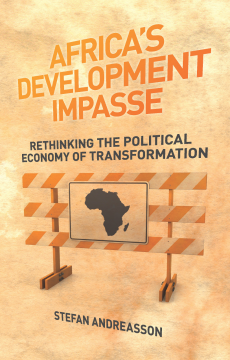
Additional Information
Book Details
Abstract
Orthodox strategies for socio-economic development have failed spectacularly in Southern Africa. Neither the developmental state nor neoliberal reform seems able to provide a solution to Africa's problems.
In Africa's Development Impasse, Stefan Andreasson analyses this failure and explores the potential for post-development alternatives. Examining the post-independence trajectories of Botswana, Zimbabwe and South Africa, the book shows three different examples of this failure to overcome a debilitating colonial legacy. Andreasson then argues that it is now time to resuscitate post-development theory's challenge to conventional development. In doing this, he claims, we face the enormous challenge of translating post-development into actual politics for a socially and politically sustainable future and using it as a dialogue about what the aims and aspirations of post-colonial societies might become.
This important fusion of theory with empirical case studies will be essential reading for students of development politics and Africa.
Stefan Andreasson is Lecturer in Comparative Politics in the School of Politics, International Studies and Philosophy at Queen's University Belfast. His research has appeared in journals including, among others, Journal of Contemporary African Studies, Third World Quarterly, Capitalism Nature Socialism, Political Studies, Democratization, and Business and Society.
'This book constitutes a major contribution to (Southern) African & (post-) development studies at the start of the second decade of the 21st century following the recent global financial restructuring.'
Timothy M Shaw, University of the West Indies
'This important book interrogates Africa’s position under the conditions of late modernity and the hegemony of liberalism and offers up an original vision for a genuinely emancipatory project that may, finally, create space for the continent’s own thinking on development issues.'
Ian Taylor, University of St Andrews/University of Stellenbosch
'A bold and imaginative reflection, in the context of southern Africa, on what the post-development injunction to seek alternatives to development can actually mean.'
Richard Sandbrook, University of Toronto
'This is an excellent contribution in the post-development studies literature and an inspiring book to place in the hands of those who need to carry out the transformation...'
Marte Conde, Progress in Development Studies
'Africa's Development Impasse is commendable above all for its willingness to engage with ideas about the radical transformations necessary to come to genuinely broad-based and sustainable development in an African post-colonial order...'
Bram Buscher, The Journal of Modern African Studies
'Andreasson unveils in this book a highly innovative contribution to the discussion about how and in which ways Africa can negotiate to forge its own future... The book is thought-provoking...'
Africa Today
'A provocative and path-breaking study...'
Giuliano Martiniello, Leeds African Studies Bulletin
Table of Contents
| Section Title | Page | Action | Price |
|---|---|---|---|
| About the author | i | ||
| Acknowledgements | vii | ||
| Key abbreviations | ix | ||
| Introduction | 1 | ||
| The argument in brief | 3 | ||
| Outline of the book | 7 | ||
| Part One | From development to postdevelopment | 13 | ||
| 1 | Foundations for development in southern Africa | 15 | ||
| Capitalism and development | 15 | ||
| The political economy of southern Africa | 21 | ||
| The targets of development | 30 | ||
| The struggle continues | 34 | ||
| 2 | The elusive developmental nexus | 36 | ||
| Institutions, actors and development | 36 | ||
| The pursuit of private versus public goods | 39 | ||
| Developmental states and corporatism | 43 | ||
| Corporatism in southern Africa | 46 | ||
| The developmental nexus | 53 | ||
| Beyond institutional orthodoxy | 58 | ||
| 3 | Beyond development | 64 | ||
| A modern predicament | 64 | ||
| Post-development theory redux | 68 | ||
| The ‘Afro-pessimist’ scenario | 78 | ||
| Modernity, alienation and ubuntu | 83 | ||
| Concluding thoughts on a ‘South–South’ dialogue moving beyond development | 88 | ||
| Part Two | Comparative regional trajectories | 91 | ||
| 4 | Botswana: paternalism and the developmental state | 93 | ||
| Botswana’s miracle: the post-independence development trajectory | 96 | ||
| Explaining Botswana’s exceptionality | 102 | ||
| Benevolent paternalism or creeping authoritarianism? | 107 | ||
| Sociocultural foundations for rethinking development | 113 | ||
| 5 | Zimbabwe: the failing state revisited | 119 | ||
| A violent birth | 119 | ||
| Independence and consolidation of power: an ongoing struggle | 122 | ||
| Structural adjustment, indigenization and the unravelling of patronage | 129 | ||
| The perfect storm: land invasions and Zimbabwe’s final descent into violence | 140 | ||
| Prospects for a new beginning in Zimbabwe | 147 | ||
| 6 | South Africa: normalization of uneven development | 154 | ||
| Miracle, tragedy or just ordinary? | 154 | ||
| From exceptional case to ordinary country | 158 | ||
| African Renaissance or nativist cul-de-sac? | 166 | ||
| New directions with Zuma? | 179 | ||
| Strength in diversity? | 189 | ||
| Conclusion: comparative lessons from southern Africa | 191 | ||
| Notes | 200 | ||
| Introduction | 200 | ||
| Chapter 1 | 200 | ||
| Chapter 2 | 203 | ||
| Chapter 3 | 206 | ||
| Chapter 4 | 210 | ||
| Chapter 5 | 214 | ||
| Chapter 6 | 218 | ||
| Conclusion | 220 | ||
| Bibliography | 221 | ||
| Index | 249 |
